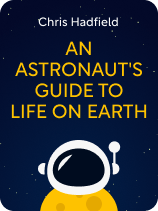

This article is an excerpt from the Shortform book guide to "An Astronaut's Guide to Life on Earth" by Chris Hadfield. Shortform has the world's best summaries and analyses of books you should be reading.
Like this article? Sign up for a free trial here.
How do you find happiness in everyday life? What are the little things that can give you joy?
According to Chris Hadfield’s book An Astronaut’s Guide to Life on Earth, you’ll live a more satisfying life if you find joy in everyday moments. This is more fulfilling than relying on large milestones and achievements for happiness.
Here are explore two reasons Hadfield believes finding happiness in everyday life is important.
Reason 1: Large Milestones Are Infrequent
Hadfield claims that finding happiness in everyday life and its small moments is important because large milestones and achievements are often few and far between. If you rely on large milestones to provide you with satisfaction, you’ll be unfulfilled for the majority of the time. On the other hand, if you learn to enjoy the time between these infrequent milestones, you’ll find life more satisfying. For instance, Hadfield spent 21 years as an astronaut, but he only spent a total of about six months in space. He says that he enjoyed all 21 years of his career because he didn’t only relish his time in space—he also delighted in the daily work of being an earthbound astronaut.
(Shortform note: Hadfield emphasizes that being an astronaut taught him to find joy in daily life, but he doesn’t provide strategies for applying this lesson to life on Earth. In The Book of Delights, poet and essayist Ross Gay offers a strategy for noticing and appreciating every day, positive moments (which he calls “delights”):
Write about them. He resolved to write every day about delights, from a bright red flower emerging from a crack in the asphalt to getting a cheerful text message from a friend. He claims that the act of noticing and writing about delights led him to notice and appreciate even more everyday delights.)
Reason 2: You May Never Reach Large Milestones
Large milestones are not only infrequent—they also might not happen at all. Accidents and other unexpected circumstances can rob you of these opportunities. Therefore, Hadfield argues that you shouldn’t expect to achieve your milestones—instead, think of achieving a milestone as an added perk. He adopted this mindset early on in his career because he knew that unexpected changes (such as a reduction in funding for the space program) could mean he wouldn’t go to space. He didn’t want to expect to reach the milestone of going into space, only to be devastated by the news that he couldn’t go.
(Shortform note: In Chasing Space, Leland Melvin echoes Hadfield’s point that unexpected circumstances can rob you of opportunities, and therefore you should find ways to enjoy every day you’re alive. Furthermore, Melvin models a strategy for enjoying everyday life: Remind yourself how fragile life is and how lucky you are to be alive. Melvin learned to cherish everyday life this way after witnessing a tragic accident: In 2003, seven astronauts died when the NASA space shuttle Columbia disintegrated upon returning to Earth, reminding Melvin how fortunate he is to be a living astronaut.)

———End of Preview———
Like what you just read? Read the rest of the world's best book summary and analysis of Chris Hadfield's "An Astronaut's Guide to Life on Earth" at Shortform.
Here's what you'll find in our full An Astronaut's Guide to Life on Earth summary:
- Chris Hadfield's experience of becoming an astronaut
- The five life lessons Hadfield learned in his role as an astronaut
- Why you should find joy in everyday life rather than looking forward to milestones






